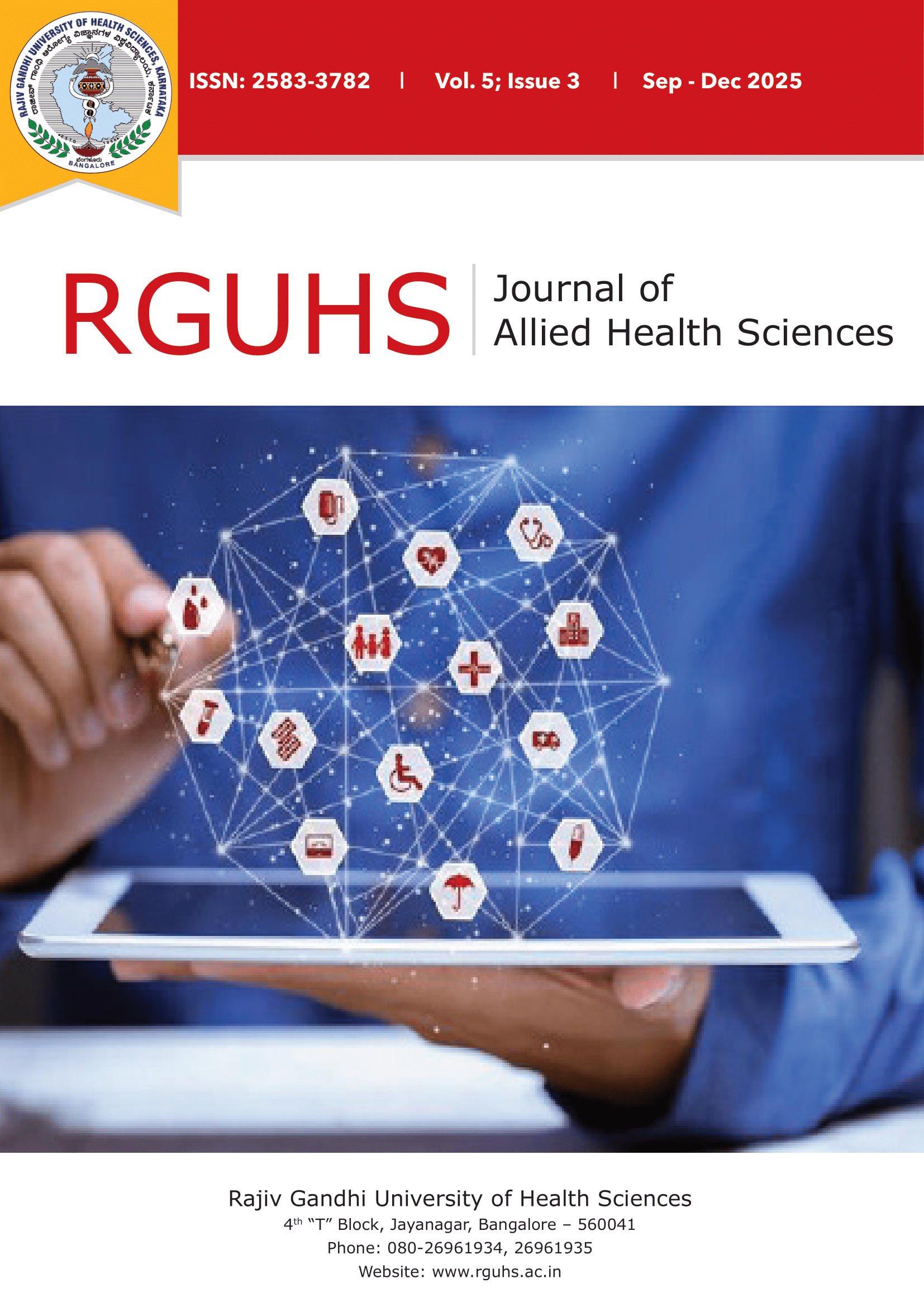
Vol No: 5 Issue No: 3 eISSN:
Dear Authors,
We invite you to watch this comprehensive video guide on the process of submitting your article online. This video will provide you with step-by-step instructions to ensure a smooth and successful submission.
Thank you for your attention and cooperation.
1Dr. Archana Bhat, Editor-in-Chief, RJAHS, Associate Professor of Pathology, Father Muller Medical College, Mangalore, Karnataka, India
*Corresponding Author:
Dr. Archana Bhat, Editor-in-Chief, RJAHS, Associate Professor of Pathology, Father Muller Medical College, Mangalore, Karnataka, India, Email:
Abstract
None
Keywords
Downloads
-
1FullTextPDF
Article
The allied health professionals form a major pillar of healthcare services and workforce. They play a very important role in promoting the well-being of patients and the society. They have a role in maintaining not only the physical health but also the mental health. They have a major role in reducing morbidity. The allied heath professionals bridge the gap between medical professionals and patients and their family members. They form an integral and important unit of the health care multidisciplinary team. As such, their role in the field of research is crucial and is of great significance. However, the research culture among allied health professionals and students is not very encouraging. This is concerning and needs to be investigated.
The allied health professionals can help in the translation of research outcomes into clinical practices and thus help in optimizing patient care. Some of them can be potential research generators. Unfortunately, most of them are mainly involved in clinical, laboratory work and patient care. Lack of motivation and guidance for students hamper research culture. Lack of awareness and knowledge regarding research is another barrier. Time constraints, lack of support and funding are other factors that hamper research culture among the allied health professionals.
There is a great need for fostering research culture among the faculty and students of the allied health sciences. The projects for postgraduates and interns are a welcome initiative in this regard. A simple project undertaken by a student will help in understanding the nitty gritty of research. With the help of an efficient guide and faculty, this may encourage the student to undertake more research studies in future. There is a need for promoting research culture among the allied healthcare students and professionals. This involves building the research capacity of individuals to higher levels, which will help them in conducting quality research, ultimately leading to improved patient outcomes and care.
Regular training programs and workshops can be conducted in the colleges of allied health sciences. These programs can be designed to simplify the idea of research and publications to students. Students can be trained in writing research proposals, planning research, applying for grants, understanding the basics of biostatistics and engaging in the interdisciplinary collaborations. To keep the students oriented and updated in their fields, they can be encouraged to read current issues of various standard journals pertaining to their fields.
Journal clubs can be introduced for students. Students can be asked to present recent journal articles in the class. A faculty moderator or guide can help them. This brings me to another important point i.e. faculty development programs for the allied health professionals. The faculty can be trained through workshops on research and manuscript writing. Further research and publications can be incentivized for motivating them. Faculty trained by expert resource faculty will be in a better position to guide and motivate their students, thus fostering research culture.
In conclusion, research culture needs to be encouraged among the allied health professionals, as they can be potential sources of innovative and novel ideas that could help our society and patients, especially in resource limited settings.
I thank the assistant editors, Dr. Arvind and Dr. Manjunath for their valuable review and suggestions. I extend my thanks to the Healthminds team for their assistance in preparing the editorial.
Supporting File
References
None